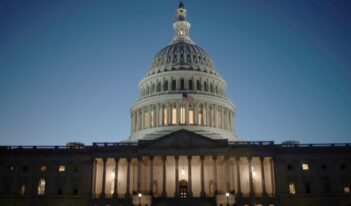
The Inflation Reduction Act aims to constrain rapidly increasing drug prices in the United States.
The cost of brand-name drugs in the United States is up to four times higher than in other countries. As a result, U.S. citizens often spend more for the typical brand name prescription than consumers living elsewhere.
As the cost of drugs rapidly and disproportionately increases in the United States, how can regulators limit out-of-pocket expenses to consumers?
This summer, legislators empowered the Secretary of the U.S. Department of Health and Human Services (HHS) to negotiate directly with drug manufacturers on behalf of Medicare recipients. Through the Inflation Reduction Act (IRA), the U.S. Congress created a “Drug Price Negotiation Program,” in which the HHS Secretary and drug manufacturers will negotiate a “maximum fair price” for some brand-name drugs that have no generic competitors.
In the past, the U.S. Congress prohibited HHS, the federal agency that oversees the Medicare program, from engaging in any direct negotiations with drug manufacturers to ensure competition and innovation in the drug marketplace.
By prohibiting direct negotiations, however, Congress allowed a small number of highly priced brand name drugs to dominate Medicare reimbursement costs. Just 10 brand name drugs accounted for nearly half of all Medicare drug reimbursements in 2013.
The Pharmaceutical Research and Manufacturers of America (PhRMA)—a voluntary association of pharmaceutical and biotechnology companies—had argued that permitting the HHS Secretary to negotiate down drug prices would impede drug manufacturers’ ability to innovate new drugs.
In addition, PhRMA had claimed that, although federal law prohibits direct HHS negotiation with drug manufacturers, powerful purchasers such as insurance companies already negotiate with drug manufacturers to secure discounts and rebates, reducing drug prices to fair and competitive rates.
But experts have disputed the assertion that innovation justifies the high price of pharmaceuticals. Rather, they argue that financial support from public sources, such as the National Institutes of Health, is far more critical to innovation than from drug manufacturers.
For example, one study found that publicly funded U.S. researchers—as opposed to drug manufacturers—produced the majority of published research directly responsible for the development of the top five drugs sold in 1995. Furthermore, federal funding from the National Institutes of Health has totaled over $700 billion for the research and manufacture of pharmaceuticals in the past two decades.
Experts also dispute the pharmaceutical industry’s assertion that permitting the HHS Secretary to negotiate drug prices would necessarily entail a reduction in drug manufacturers’ research and development budgets. Given that drug manufacturers spend a significantly greater amount on marketing than research and development, experts argue that a decrease in research spending is unlikely.
According to the Biden Administration, the IRA provision that permits direct negotiations between the HHS Secretary and drug manufacturers will protect Medicare recipients from “catastrophic drug costs.” The Biden Administration estimates that this provision alone will reduce prescription drug costs for up to 7 million Medicare recipients.
In addition to the negotiation provision, the IRA will also limit the out-of-pocket expenses and the monthly insulin costs of recipients enrolled in Medicare Part D—a drug benefit program that covers nearly 50 million U.S. residents.
Beginning in 2023, recipients enrolled in Medicare Part D will pay no more than $35 per month for insulin. And starting in 2025, the Inflation Reduction Act will cap the out-of-pocket expenses of recipients enrolled in Medicare Part D to $2,000. The Biden Administration estimates that the cap on out-of-pocket expenses will provide all recipients “peace of mind” and that the cap on insulin prices will directly benefit 3.3 million Medicare recipients.
HHS Secretary Xavier Becerra has praised the IRA as “one of the most consequential pieces of legislation in our lifetimes,” adding that HHS is “prepared to implement the Medicare drug negotiation” provision with “the highest standard.”
Pursuant to the IRA, the HHS Secretary will select 50 of the most expensive drugs without generic alternatives for the now-authorized drug price negotiation program. The Secretary is slated to begin negotiations with drug manufacturers on 10 of those drugs in October 2023. Negotiated prices for these initial drugs, however, will not take effect until 2026.
Although much remains uncertain about the future of U.S. drug prices for those without Medicare coverage, it is clear that many policymakers believe lowering drug costs for Medicare recipients depends upon the ability of the HHS Secretary to negotiate directly with drug manufacturers, rather than depend solely on the competitive forces of the market.



